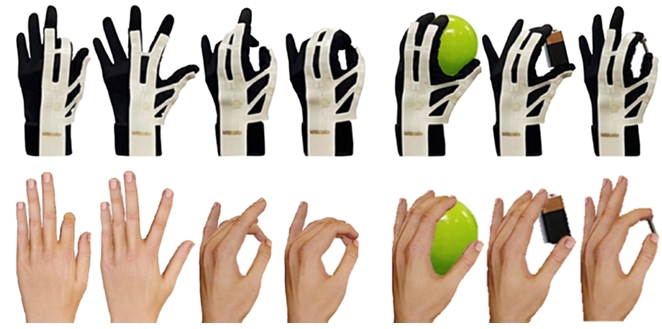Research News
[Prof. Yong-Lae Park] Develops The Bilateral Back Extensor Exosuit Revolutionizing Workplace Safety
Author
김민아
Date
2024-07-23
Views
750
| • Developed motion-sensing glove published in the international journal Nature Communications • Enhanced motion tracking accuracy, expanding potential applications in remote surgery and VR/AR |
 (From left) Professor Yong-Lae Park from the Department of Mechanical Engineering at Seoul National University,
(From left) Professor Yong-Lae Park from the Department of Mechanical Engineering at Seoul National University,
Dr. Myungsun Park, and the motion-sensing glove
Background and Necessity of the Research
The human hand's complex structure and high degrees of freedom have made accurate tracking and reconstruction of hand movements a significant challenge. Previous studies often detected only a limited range of hand motions or estimated specific finger positions, limiting practical applications. Professor Park's team proposed a new approach to accurately track the overall movements of the hand to address these issues.Innovative Design of the Stretchable Glove
The developed stretchable glove uses flexible liquid metal sensors to simultaneously estimate finger bone lengths and joint angles through a single sensing mechanism. It is designed to fit hands of any size, enabling real-time tracking and reconstruction of the wearer's hand movements.Key Achievements and Applications
According to Professor Park's research, the stretchable glove boasts an error margin of approximately 2 mm in estimating bone length and within 5° in estimating joint angles. The fingertip position estimation error is around 4 mm, allowing nearly exact reproduction of fingertip movements. This level of accuracy enables precise tasks such as remotely touching icons on a smartphone screen or pressing buttons on a TV remote control. Such high precision significantly enhances potential applications in fields like remote surgical robots, humanoid robot hand remote control, and virtual reality (VR) and augmented reality (AR).Future Research Directions
Professor Park stated, "The ability to accurately track and reconstruct various hand movements with this stretchable glove will enable more precise robot manipulation and interaction in the future." He also anticipated that this glove would become a crucial tool in not only robotics but also the medical field.This research was conducted in collaboration with Yonsei University and supported by the Ministry of Science and ICT and the Ministry of Trade, Industry and Energy. The first author of the paper, Dr. Myungsun Park, received her Ph.D. from the Department of Mechanical Engineering at Seoul National University last February and is currently a postdoctoral researcher at the University of California, San Diego.
 ▲ Examples of various motion tracking (top) and hand shape reconstruction in a virtual environment (bottom) using the developed glove
▲ Examples of various motion tracking (top) and hand shape reconstruction in a virtual environment (bottom) using the developed glove
 ▲ Performance demonstration of the developed glove using shadow play (left).
▲ Performance demonstration of the developed glove using shadow play (left).
The glove-wearing hand and the actual shadow are recreated and shown in virtual reality (right).

